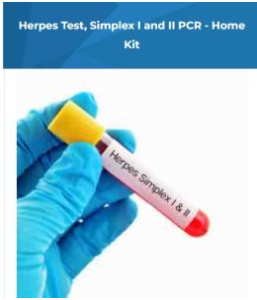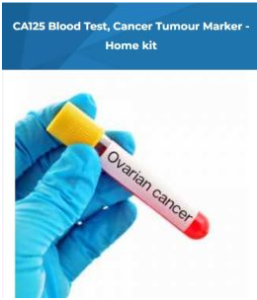Herpes is a common viral infection that can significantly impact your health and well-being. Herpes testing is crucial for managing and reducing the risks of the HSV virus spread to maintain the quality of life. Similarly, the CA125 test is a medical exam that measures the levels of a protein called CA125 in the blood. Moreover, this protein is often used as a tumor marker for certain types of cancer, particularly ovarian cancer.
This broad guide will provide you with the necessary information on herpes monitoring. Along with this, we’ll also discuss cancer antigen 125 exams.
Understanding Herpes:
This condition is a viral infection, and the virus behind it is the herpes simplex virus. There are two types: HSV-1, which usually causes oral infection (cold sores), and HSV-2, which typically causes genital infection. Both types can be transmitted through direct contact with an infected person, especially during active outbreaks.

Recognizing Symptoms:
Herpes can cause recurring outbreaks characterized by painful blisters or sores on the mouth, lips, genitals, or surrounding areas. Tingling, itching, or a burning sensation may proceed after the spread of this infection. Some people may experience flu-like symptoms such as fever, body aches, and swollen lymph nodes during the initial spread. It’s important to note that this infection can also be asymptomatic, meaning you may not experience any noticeable symptoms.
Regular Self-Monitoring and Medical Evaluation:
If you have been diagnosed with this infection, monitoring your body for any signs of the spread is important. Pay attention to any unusual sensations or changes in the affected areas. You can take prompt action and minimize discomfort by knowing your body and recognizing the early signs of the spread.
Seek medical attention if you suspect an outbreak or experiencing any concerning symptoms. A medical worker can evaluate your symptoms, confirm the diagnosis through herpes testing, and provide appropriate treatment. They can also guide you on monitoring techniques and offer advice on effectively managing this disease’s spread.
Lifestyle Modifications and Emotional Support:
Certain lifestyle modifications can help manage its spread and reduce transmission risks. These include maintaining good hygiene, avoiding triggers (such as stress, fatigue, and exposure to extreme weather conditions), practicing safe sex, using barrier methods like condoms, and avoiding sexual activity during active outbreaks or when prodromal symptoms are present.
Living with this infection can have emotional implications. It’s important to seek emotional support and understanding from friends, family, or support groups. Connecting with others with similar experiences can provide a sense of community and help you navigate the emotional aspects of this HSV infection.
Regular Self-Monitoring and Medical Evaluation:
If you have been diagnosed with this infection, monitoring your body for any signs of the spread is important. Pay attention to any unusual sensations or changes in the affected areas. You can take prompt action and minimize discomfort by knowing your body and recognizing the early signs of the spread.
Seek medical attention if you suspect an outbreak or experiencing any concerning symptoms. A medical worker can evaluate your symptoms, confirm the diagnosis through herpes testing, and provide appropriate treatment. They can also guide you on monitoring techniques and offer advice on effectively managing this disease’s spread.
Lifestyle Modifications and Emotional Support:
Certain lifestyle modifications can help manage its spread and reduce transmission risks. These include maintaining good hygiene, avoiding triggers (such as stress, fatigue, and exposure to extreme weather conditions), practicing safe sex, using barrier methods like condoms, and avoiding sexual activity during active outbreaks or when prodromal symptoms are present.
Living with this infection can have emotional implications. It’s important to seek emotional support and understanding from friends, family, or support groups. Connecting with others with similar experiences can provide a sense of community and help you navigate the emotional aspects of this HSV infection.
Regular Herpes Testing:
Regular check-ups with your medical worker are essential for monitoring the overall status of your infection. These visits allow your healthcare provider to assess your condition, discuss any concerns or questions you may have, and provide necessary guidance on managing this HSV virus effectively.
Protecting Sexual Partners and Use of Antiviral Medications:
Open and honest communication with your sexual partners protects their health. Inform them about your HSV diagnosis and discuss ways to reduce the risk of transmission. Using condoms, avoiding sexual activity during outbreaks, and considering antiviral therapy are some strategies that can help protect your partners.
Antiviral medications can manage this infection, reducing their frequency and duration. These medications can help control symptoms, promote healing, and decrease the risk of transmitting the virus to others. Consult your healthcare provider to discuss your situation’s appropriate antiviral treatment options.
What is CA125? What is its Purpose?
CA125 is a protein. Body cells naturally produce this protein in the blood. It is in higher amounts in certain cancer cells, particularly ovarian ones. However, it’s important to note that its elevated level can also be present in other non-cancerous conditions, such as endometriosis, pelvic inflammatory disease, and even during menstruation.
The primary purpose of this monitoring is to help detect and monitor the progression of ovarian cancer. It can also be used to assess the response to treatment, detect recurrences, and provide information about the effectiveness of therapy. However, this alone is insufficient for diagnosing ovarian cancer; further diagnostic exams may be required.
When is CA125 Testing Recommended?
This monitoring is common for individuals with a high risk of ovarian cancer. It may also be used for those previously diagnosed with ovarian cancer and undergoing treatment or surveillance. Your medical worker will determine whether this monitoring is necessary based on your medical history and risk factors. Like herpes testing, this exam also holds a vital part in a woman’s life.

How is CA125 Testing Done? Result Interpretation
This exam involves a simple blood draw, where a healthcare professional will collect a small blood sample. Then they send the sample to a lab for analysis. The results are usually available within a few days, and your healthcare provider will interpret them and discuss them with you.
One can measure the level of cancer antigen 125 in units called U/mL (units per milliliter). Normal levels of this protein vary depending on the lab and checking method used. In general, levels below 35 U/mL are normal. However, it’s important to note that the elevation of cancer antigen levels does not always indicate the presence of cancer. Furthermore, it needs extra analysis to determine the exact cause.
Limitations of Cancer Antigen 125 Monitoring:
While this monitoring can be useful in certain situations, it has some limitations. The levels of this protein can be elevated in non-cancerous conditions, and some ovarian cancers may not produce high levels of this protein. Its levels can also change for various reasons, such as inflammation or other medical conditions. Therefore, it is necessary to use this monitoring with other diagnostic exams and medical analyses.
Communication with Your Medical Worker or Doctor:
Maintaining open and regular communication with your medical worker or doctor regarding cancer antigen monitoring is important. Discuss any concerns or questions you may have and ensure you understand the purpose of the exam and its limitations. Your medical worker will guide you on the appropriate frequency of this monitoring based on your specific situation.
Conclusion
HSV is a manageable viral condition, and herpes testing is necessary for its management. By understanding the virus, recognizing symptoms, practicing self-monitoring, seeking medical evaluation, making lifestyle modifications, taking antiviral medications, seeking emotional support, attending regular check-ups, and protecting sexual partners, you can effectively monitor and manage this condition.
On the other hand, CA125 testing is a valuable tool in the management and surveillance of ovarian cancer. By understanding the purpose of this exam and knowing its recommendations and limitations, you can actively participate in your medical journey. Remember to communicate with your medical professional or doctor, follow their recommendations, and undergo further diagnostic exams to ensure broad and organic monitoring and care.

